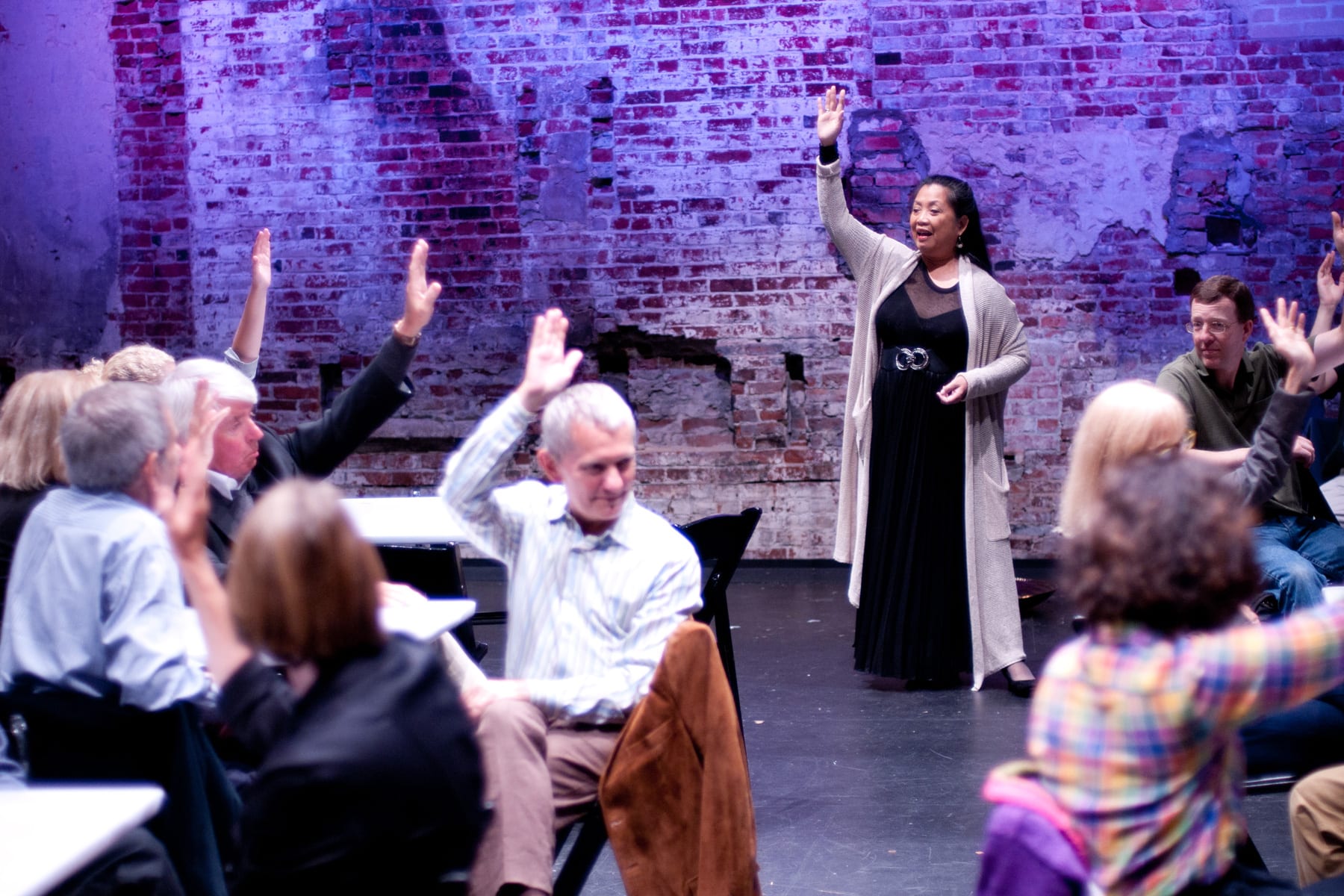
Erwin E. A. Thomas (center), Mia Katigbak (right) Photo: Mike Ritter/ritterbin.com All people not named are audience members
Traditional theater often challenges us to think about our values. We see outsized personalities pitched in extreme conflicts, forced into difficult moral decisions. We laugh at these characters, feel “sorrow and pity” for them, and then afterwards, we judge how they did. We wonder how we’d do in their places, maybe argue a case with our dates. This is an ideal anyway—that after being transported for a couple of hours we will find the activity of considering our responses to be equally stimulating, even useful.
Theater artists normally have little control over this part of the process. That’s what makes the Foundry Theatre’s “How Much is Enough: Our Values in Question,” an exciting and risky experiment. The show—and it is very much a show—scraps that whole “play” part, where a story is told to which we then react. It rather assumes that we all have personal stories from which to extrapolate. Audiences are asked to share pieces of these as they dive in to the types of questions they might usually approach in the restaurant, or the bar or the subway car, after curtain call.
Light jazz and dim lighting starts the show, as audience members sit at what appear to be cafeteria tables from an Apple store—they are glowing white plastic, and questions about one’s life and past scroll across them like migrating tweets. Some time is allowed for private warm-up conversations. Microphones hang from the ceiling, a projector looms on a wall, and everyone suspects that something is up.
Enter our show’s main characters: the moderators. A skinny, young-looking white guy, played by Noel Joseph Allain, tells us that his girlfriend is pregnant. He is nervous and seeking advice. He alternates between neutrality and disarming humility. A broad-shouldered young black guy, played by Erwin E.A. Thomas, is somewhat of a foil. He tells us that he is less interested in our considered philosophical opinions than he is in our imaginations. He alternates between neutrality and a fiery intensity that borders on aggression. Balancing the two somewhat, a middle-aged Asian woman, played by Mia Katigbak maintains warmth and calm, projecting wisdom.
Through brief speeches and ceremonies, these characters try to create an environment in which the audience feels safe enough to respond openly and interestingly, when called upon to answer questions about work, money, possessions, and the things they hold dear. Their success varies greatly. The atmosphere quickly shifts from that of a high-tech jazz club to somewhere between a psychology experiment, a marketing focus group and an improv comedy show.
Certainly a community is forged, a community that feels more exciting to be apart of then the audience for a traditional narrative play on a proscenium stage. But the moderators’ sustained earnestness and artificial neutrality make it feel less intimate.
Sitting in this audience, a nervous thrill comes from the feeling that one could be called upon to essentially perform, at any moment. The evening’s emotional content comes from those great moments when the audience delivers, or the actors are thrown slightly off their scripts.
The questions are good ones. Devised by playwright Kirk Lynn, they begin with preparing for the arrival of a baby, progress through early childhood, student days, work life and retirement, and end with facing death. Some are straightforward, some pointed, some creative, all are worthy of consideration in a place apart from the day-to-day.
The experiment’s limitations come from the fact that the moderators do not react to the answers performed by their guests. There are no follow-up questions and speakers are never asked to respond to previous answers. No doubt this is about making audience members feel safe enough to share, but at the same time, what it facilitates is a more of a survey than a dialogue.
So the results are mixed, but the experiment is a noble one. It will certainly require its own after-show processing, and if nothing else, will challenge your thinking on theater’s goals and methods.
“How Much is Enough: Our Values in Question,” written by Kirk Lynn, co-created and directed by Melanie Joseph and presented by the Foundry Theatre, plays at ArtsEmerson‘s Jackie Libergott Black Box in the Paramount Center through September 25.


Leave a Reply